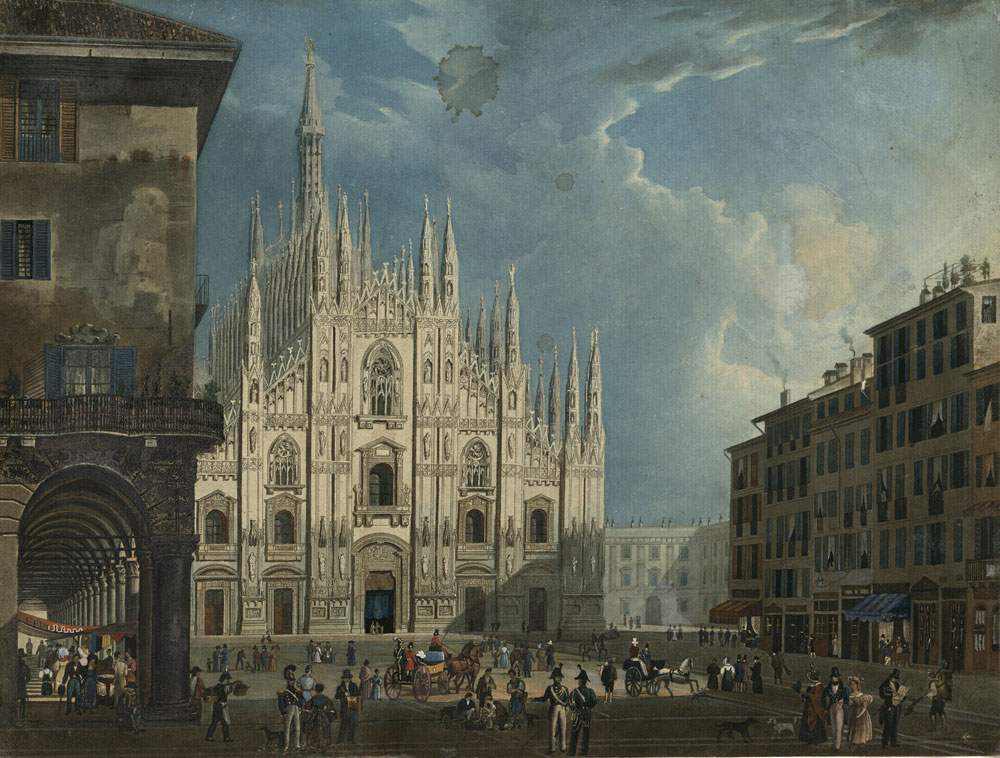In Milan, from November 9, 2019 to February 8, 2020, the Sala del Grechetto of Palazzo Sormani, home of the Library, hosts the exhibition Giacomo Leopardi. Infinito Incanto, two hundred years after the composition of L’Infinito.
In fact, the exhibition intends to celebrate Giacomo Leopardi and L’ Infinito, which found its first typographical guise in Milan in the magazine Il Nuovo Ricoglitore; curated by William Spaggiari, the exhibition offers visitors the opportunity to admire a significant corpus of documents, some rare and never exhibited, that belong to the Sormani Library’s Fondo Leopardiano: manuscript transcriptions, original printed editions of works by the celebrated poet from Recanati and the most authoritative non-fiction that has come out over two centuries.
Through the analysis of Leopardi’s reflections on the great Italian urban centers at which he stayed after leaving Recanati, the review aims to focus on the significance of the city in Leopardi’s poetic and philosophical experience, as curator William Spaggiari explains in his introduction: "In those same years, Leopardi entrusted to his literary work in verse and prose, to his correspondence with family and friends, and to the secret pages of the Zibaldone his reflections on the physiognomy and characters of the civically conscious citizen, on the real ’form’ (because verified in fact) of the city agglomerations, or on what they should have been."
As is well known, in fact, Leopardi sojourned in Milan, Bologna, Florence, Pisa, Rome and Naples, where he found inspiration for his literary-philosophical production and where he made important encounters; although city life was very difficult for the poet because of his health problems, his poor adaptability and his solitary character. The epistolary contains a number of critical reflections on the city experience, often in relation to the memory of the native village.
On the one hand, Milan is seen by the poet as a target for harsh criticism, but on the other hand, it is considered an ideal destination for the dissemination of his writings in high cultural circles; his relationship with the publisher Antonio Fortunato Stella proved crucial for the publication and dissemination of his works during his lifetime. Starting with the Milanese experience, the exhibition will analyze Leopardi’s considerations of society and living in the big city.
It will also feature a rich iconographic apparatus composed of paintings and prints depicting places, characters and moments of 19th-century Milan from the Civica Raccolta delle Stampe “Achille Bertarelli” of the Castello Sforzesco, the Civiche Raccolte Storiche Palazzo Morando Costume Moda Immagine and Palazzo Moriggia Museo del Risorgimento and the Casa del Manzoni. TheCultural Association Meneghina Family Library Garden Society will then offer a series of translations into Milanese of L’Infinito made by I Poeti della Meneghina.
There will also be meetings aimed at exploring the themes of the exhibition and outlining the context of Leopardi’s biographical and poetic experience.
For info: https://milano.biblioteche.it/
Hours: Monday to Friday 3 to 7 p.m.; Saturday 9 a.m. to 12:30 p.m. Closed Sundays and holidays.
Free admission.
 |
| Milan as Seen by Leopardi. An exhibition two hundred years after The Infinite |
Warning: the translation into English of the original Italian article was created using automatic tools. We undertake to review all articles, but we do not guarantee the total absence of inaccuracies in the translation due to the program. You can find the original by clicking on the ITA button. If you find any mistake,please contact us.